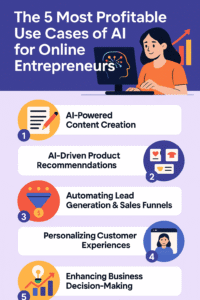Introduction: From Burnout to Breakthrough
In 2023, Sarah, a freelance digital marketer, found herself overwhelmed. Managing multiple clients, creating content, and handling administrative tasks left her burnt out and questioning her career choice. Upon discovering AI tools like ChatGPT and Jasper, she began automating content creation, lead generation, and even customer service. By 2024, Sarah had tripled her income and regained her work-life balance.

Sarah’s story isn’t unique. Many online entrepreneurs are leveraging AI to enhance productivity and profitability. This article explores the five most profitable AI use cases for online entrepreneurs, grounded in psychological theories that explain why these strategies are effective.
1. AI-Powered Content Creation: Scaling Creativity
Creating consistent, high-quality content is crucial for online visibility and engagement. AI tools like Jasper, Copy.ai, and Writesonic assist in generating blog posts, social media content, and email newsletters.
Benefits:
-
Accelerates content production
-
Ensures consistency in brand voice
-
Reduces reliance on outsourcing.
Psychological Insight: Self-Efficacy Theory
Albert Bandura’s Self-Efficacy Theory posits that belief in one’s capabilities influences actions and outcomes. By using AI tools, entrepreneurs can enhance their confidence in content creation, leading to increased productivity and success.
2. Automating Lead Generation and Sales Funnels
AI-driven chatbots and email automation platforms like ManyChat and Mailchimp enable entrepreneurs to engage with potential customers 24/7. These tools can qualify leads, answer queries, and nurture prospects through the sales funnel.
Advantages:
-
Provides immediate responses to customer inquiries
-
Personalizes user experiences
-
Increases conversion rates
Psychological Insight: Expectancy Theory
Victor Vroom’s Expectancy Theory suggests that individuals are motivated when they believe their efforts will lead to desired outcomes. Automated systems reinforce this by providing timely and relevant responses, encouraging customers to proceed with purchases.
3. AI-Driven Digital Product Creation
Entrepreneurs are utilizing AI to develop digital products such as eBooks, online courses, and design templates. Tools like Notion AI and Canva assist in content generation and design, streamlining the product development process.
Benefits:
-
Reduces time to market
-
Lowers production costs
-
Enables rapid testing of product ideas.
Psychological Insight: Theory of Planned Behavior
Icek Ajzen’s Theory of Planned Behavior emphasizes that intention, influenced by attitude, subjective norms, and perceived behavioral control, predicts behavior. AI tools enhance perceived control by simplifying complex tasks, increasing the likelihood of product creation.
4. Offering AI-Enhanced Services
Freelancers and agencies are integrating AI into their service offerings. For instance, using AI for data analysis, content optimization, or customer segmentation adds value to their services.
Advantages:
-
Differentiates services in a competitive market
-
Improves efficiency and accuracy
-
Allows for scalable solutions
Psychological Insight: Achievement Motivation Theory
David McClelland’s Achievement Motivation Theory identifies the need for achievement as a key driver of behavior. By adopting AI, service providers can achieve higher standards of performance, fulfilling their intrinsic motivation for excellence.
5. AI for Market Research and Business Validation
Understanding market trends and customer needs is vital. AI tools like ChatGPT and Google Trends assist in analyzing data, identifying patterns, and predicting consumer behavior.
Benefits:
-
Provides insights into customer preferences
-
Identifies emerging market opportunities
-
Reduces risk in decision-making.
Psychological Insight: Locus of Control Theory
Julian Rotter’s Locus of Control Theory differentiates between internal and external control beliefs. Entrepreneurs with an internal locus believe they can influence outcomes. AI tools empower them with information, reinforcing this belief and encouraging proactive strategies.
5-Step Action Plan to Implement AI in Your Business
-
Identify Repetitive Tasks: List tasks that are time-consuming and repetitive.
-
Research AI Tools: Explore AI solutions tailored to your needs.
-
Start Small: Implement AI in one area before scaling.
-
Monitor Performance: Track the effectiveness of AI tools and make adjustments.
-
Stay Updated: Continuously learn about new AI developments to stay competitive.
Conclusion: Embracing AI for Entrepreneurial Success
Integrating AI into your business operations can lead to increased efficiency, innovation, and profitability. By understanding and applying psychological principles, entrepreneurs can make informed decisions about adopting AI technologies. Start by identifying areas where AI can add value, and take incremental steps to incorporate these tools into your workflow.
Summary:
-
AI enhances content creation, lead generation, product development, service offerings, and market research.
-
Psychological theories provide insights into the effectiveness of AI adoption.
-
A structured approach to implementing AI can lead to sustainable business growth.
Bibliography
-
Bandura, A. (1977). Self-efficacy: Toward a unifying theory of behavioral change. Psychological Review, 84(2), 191–215.
-
Vroom, V. H. (1964). Work and motivation. New York: Wiley.
-
Ajzen, I. (1991). The theory of planned behavior. Organizational Behavior and Human Decision Processes, 50(2), 179–211.
-
McClelland, D. C. (1961). The achieving society. Princeton, NJ: Van Nostrand.
-
Rotter, J. B. (1966). Generalized expectancies for internal versus external control of reinforcement. Psychological Monographs: General and Applied, 80(1), 1–28.
✅ Your Next Step:
Pick one AI tool. Automate one task. Save your first hour.
Ready to take the first step? Grab our free AI Toolstack PDF or explore our “Prompt Pack for Creators” to get started today.